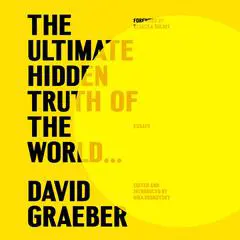 Play Audiobook Sample
Play Audiobook Sample
Debt - Updated and Expanded: The First 5,000 Years Audiobook
 Play Audiobook Sample
Play Audiobook Sample
Quick Stats About this Audiobook
Total Audiobook Chapters:
Longest Chapter Length:
Shortest Chapter Length:
Average Chapter Length:
Audiobooks by this Author:
Publisher Description
Now in audio, the updated and expanded edition : David Graeber’s “fresh . . . fascinating . . . thought-provoking . . . and exceedingly timely” (Financial Times) history of debt Here anthropologist David Graeber presents a stunning reversal of conventional wisdom: he shows that before there was money, there was debt. For more than 5,000 years, since the beginnings of the first agrarian empires, humans have used elaborate credit systems to buy and sell goods—that is, long before the invention of coins or cash. It is in this era, Graeber argues, that we also first encounter a society divided into debtors and creditors. Graeber shows that arguments about debt and debt forgiveness have been at the center of political debates from Italy to China, as well as sparking innumerable insurrections. He also brilliantly demonstrates that the language of the ancient works of law and religion (words like “guilt,” “sin,” and “redemption”) derive in large part from ancient debates about debt, and shape even our most basic ideas of right and wrong. We are still fighting these battles today without knowing it.
Download and start listening now!
""Debt: The First 5,000 Years" by David Graeber is a thought-provoking and comprehensive exploration of the history, politics, and cultural significance of debt. Graeber argues that the conventional narrative of debt as a moral obligation to repay is a recent invention, and that debt has played a central role in human society for thousands of years. He challenges the notion that debt is a purely economic phenomenon, and instead shows how debt is intimately tied to power relations, social hierarchies, and cultural values.Throughout the book, Graeber draws on a wide range of examples from different cultures and historical periods to illustrate his arguments. He shows how debt has been used as a tool of domination and control by rulers, merchants, and bankers, and how debt has been used to justify everything from slavery to imperialism. He also shows how debt has been a source of resistance and rebellion, and how people have used debt to challenge the power of the wealthy and the state.Graeber's writing is engaging and accessible, and he manages to combine deep historical research with a sharp critique of contemporary economic and political systems. While the book is at times dense and challenging, it offers a fascinating and provocative perspective on the role of debt in human society. Overall, "Debt" is a powerful and important book that challenges us to rethink our assumptions about money, power, and social relation"
— David Mannix (5 out of 5 stars)
Quotes
-
“An engaging book. Part anthropological history and part provocative political argument, it’s a useful corrective to what passes for contemporary conversation about debt and the economy.”
— Boston Globe -
“Terrific…In the best anthropological tradition, he helps us reset our everyday ideas by exploring history and other civilizations, then boomeranging back to render our own world strange, and more open to change.”
— Globe and Mail -
“The book is more readable and entertaining than I can indicate…It is a meditation on debt, tribute, gifts, religion and the false history of money. Graeber is a scholarly researcher, an activist and a public intellectual. His field is the whole history of social and economic transactions.”
— Observer -
“One of the year’s most influential books. Graeber situates the emergence of credit within the rise of class society, the destruction of societies based on ‘webs of mutual commitment’ and the constantly implied threat of physical violence that lies behind all social relations based on money.”
— Guardian -
“An alternate history of the rise of money and markets, a sprawling, erudite, provocative work.”
— Bloomberg Businessweek -
“Controversial and thought-provoking, an excellent book.”
— Booklist
Debt - Updated and Expanded Listener Reviews
-
" The author is pure socialist and the ideas spreading in this book are not in my opinion the best. Debt jubilee is not the solution and the communism apparently is nothing to dream about. Sorry for the wasted money and time. "
— panaka09, 4/4/2020
About David Graeber
David Graeber (1961-2020) was a professor of anthropology at the London School of Economics. He is the author of several books, including the New York Times bestseller The Dawn of Everything, as well as Debt: The First 5,000 Years and Bullshit Jobs: A Theory. He was a contributor to Harper’s Magazine, the London Guardian, and The Baffler. An iconic thinker and renowned activist, his early efforts in Zuccotti Park made Occupy Wall Street an era-defining movement.
About Grover Gardner
Grover Gardner (a.k.a. Tom Parker) is an award-winning narrator with over a thousand titles to his credit. Named one of the “Best Voices of the Century” and a Golden Voice by AudioFile magazine, he has won three prestigious Audie Awards, was chosen Narrator of the Year for 2005 by Publishers Weekly, and has earned more than thirty Earphones Awards.

























